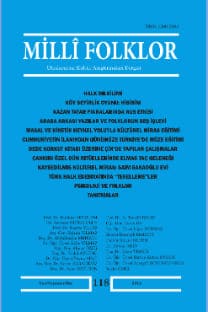CRIME AND MEDIA: THE WORLD OF 'REALITY SHOW' AS A MORAL FRAME OF REFERENCE
Suç ve Medya: Ahlaki Bir Referans Çerçevesi Olarak 'Realite Show' Dünyası
___
Bouchard, D. Michel Foucault: Language, Coun- ter-Memory, Practice: Selected Essays and Interviews. New York: Cornell University Press, 1977Connolly, W.E. Why I Am Not a Secularist. Min- neapolis: University of Minnesota Press, 1999.
Çelenk S. Televizyon Temsil Kültür: 90'lı Yıllarda Sosyokültürel İklim ve Televizyon İçerikleri. Ankara: Ütopya, 2005.
Dreyfus, H. L. and Rabinow P. Michel Foucault, Beyond Structuralism and Hermeneutics. Chicago: University of Chicago, 1983.
Foucault, M. The Archaeology of Knowledge. Trans. A. M. Sheridan Smith. London and New York: Routledge, 1969.
Foucault, M. The Order of Things. New York: Vintage, 1973.
Foucault M. "The Confession of the Flesh" Pow- er/Knowledge: Selected Interviews and Other Writings, 1972-1977. Ed. Gordon, C. New York: Pantheon, 1980: 194-228.
Gellner, E. The Psychoanalytic Movement. Lon- don: Palatin, 1985.
Gilligan, C., Ward J. V. and McLean Taylor, J. Mapping the Moral Domain: A Contribution of Women's Thinking to Psychological Theory and Education. Cambridge. MA: Harvard University Press, 1988.
Hawkins, G. "The ethics of television". Interna- tional Journal of Cultural Studies (2001), 4(4): 412-426.
Hunt, A. "Risk and moralization in everyday life". Risk and Morality. Ed. Ericson, R and Doyle, A. London: University of Toronto Press, 2003: 165-192.
Inda, J. X. Targetting Immigrants: Government, Technology and Ethics. Oxford: Blackwell Publishing, 2006.
Kaya, A. "Power of the weak in the age of pru- dentialism: Euro-Turks". European Welfare States: Citizenship, Nationalism, and Con- flict. Ed. Karolewski I. P. and Suszycki A. M. Germany: Druckerei Hubert and Co, Göttin- gen, 2013.
Krijnen, T. and Meijer, I. C. "The moral imagina- tion in primetime television". International Journal of Cultural Studies (2005), 8(3): 353-374
O'Malley, P. "The uncertain promise of risk". Australian and New Zealand Journal of Criminology (2004), 37: 323-343.
Ouelette, L. "Take responsibility for yourself: Judge Judy and the neoliberal citizen". Re- ality TV: Remaking Television Culture. Ed. Murray, S. and Ouellette, L. New York: New York University Press, 2009: 223-242.
Ouellette, L and Hay, J. Better Living through Reality TV: Television and Post-Welfare Citi- zenship. Malden, MA: Blackwell, 2008.
Örnek, A. "Türkiye'de değişen kültürel değerlerin reklama yansıması: televizyon reklamları üzerine bir içerik analizi". PhD Thesis, Selçuk University, Turkey, 2006.
Pinseler, J. "Punitive reality TV: Televising punishment and the production of Law and Order". Trans-Reality Television: The Trans- gressions of Reality, Genre, Politics and Audience. Ed. Van Bauwel, S. and Carpentier, N. Plymouth, UK: Lexington Books, 2010: 125-147.
Rose, N. "The death of the social? Re-figuring the territory of government". Economy and Soci- ety (1996), 25(3): 327-356.
Skeggs, B., Wood, H. and Thumim, N. "Making Class through Moral Extension on Reality TV". (2007) http://www.sprak.umu.se/digi- talAssets/29/29326_ ahorarkop.pdf (04.03.2014). workshop_intimacy_
Wood, H. and Skeggs, B. "Spectacular morality: Reality television, individualisation and the re-making of the working class". The Media and Social Theory. Ed. Hesmondhalgh, D. and Toynbee, J. London: Routledge, 2008: 177-193.
Zedner, L. "Pre crime and post-criminality?". Theoretical Criminology (2007), 11(2): 261- 281.
- ISSN: 1300-3984
- Yayın Aralığı: 4
- Başlangıç: 1989
- Yayıncı: Geleneksel Yayıncılık Eğitim San. Tic. Ltd. Şti.
TÜRK KÜLTÜRÜNDE GELİN SÜSLEME VE SÜSLEME USTALARI
KAZAK TÜRKLERİNİN OLUŞUMUNDA OĞUZLARIN ROLÜ ETNİK VE COĞRAFİ BÜTÜNLEŞME*
Talas OMARBEKOV, Mendigul S. NOGAYBAYEVA, Aknur KOŞIMOVA
ÂŞIKLIK GELENEĞİNDE GRUP İCRASI
UYGULAMADAKİ FOLKLORUN BİR TANIMINA DOĞRU*
KIRSAL MİRAS KORUMA STRATEJİSİ SANDIMA KÖYÜ, BODRUM
CRIME AND MEDIA: THE WORLD OF 'REALITY SHOW' AS A MORAL FRAME OF REFERENCE
YENİ OSMANLILARDAN İTTİHAT VE TERAKKİ CEMİYETİ'NE HALK KAVRAMININ KULLANIMLARI
TOPLUMSAL YAPIDAKİ DEĞİŞİMİN GÖSTERGESİ: ANTİ- ATASÖZLERİ
CRIME AND MEDIA: THE WORLD OF 'REALITY SHOW' AS A MORAL FRAME OF REFERENCE
